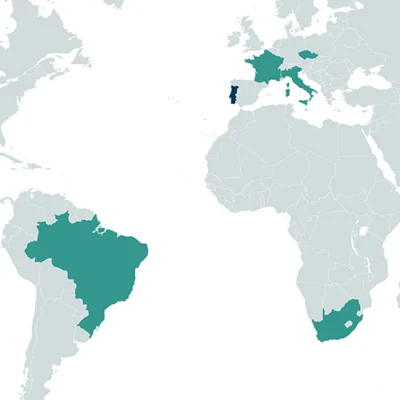Hybrid NATURE-based solutions as BIOdiversity PROMOters and their implications for emerging contaminants mitigation
Call
Duration
01/01/2025 – 31/12/2027
Total grant
Approx. 1 mil. €
More information
Patricia Cardoso, pteixeira@ciimar.up.pt
Partners of the project
- Interdisciplinary Centre of Marine and Environmental Research, Matosinhos, Portugal
- Faculty of Engineering of the University of Porto, Porto, Portugal
- Federal University of Rio Grande do Sul, Brazil
- University of Montpellier, Montpellier, France
- Czech University of Life Sciences, Prague, Czech Republic
- University of Brescia, Brescia, Italy
- Council for Scientific and Industrial Research, Cape Town, South Africa

Context
Aquatic ecosystems are increasingly threatened by numerous anthropogenic drivers, such as emerging contaminants (ECs) (e.g., pharmaceuticals, personal care products, endocrine disruptors, and pesticides), which have raised more concern in recent years. They are widespread and pose risks to the environment and associated biota. Due to the limited efficiency of wastewater treatment plants (WWTPs) in removing some of these pollutants, the treated effluents generally contain trace levels of ECs (ng/L to µg/L) that may affect the growth, metabolism, and reproduction of organisms, as well as biodiversity in the aquatic environments. Moreover, due to their ubiquity, stability and persistence in the environment, most ECs can bioaccumulate along the trophic web.
Innovative, efficient, economical, and environmentally viable solutions are crucial for removing these contaminants from wastewater effluents. Despite good results from advanced treatment methods (e.g., advanced oxidation technologies, membrane filtration), their application on a large scale can be compromised due to high energy consumption, high operating costs, and toxic degradation products. So, the implementation of new green technologies became a promising solution. NATUREBIOPROMO focuses on understanding the ecological relevance of existent NbS and their importance in the mitigation of ECs pollution while contributing to local biodiversity and their ecosystem services.
Main objectives
NATUREBIOPROMO aims to:
- Integrate and implement hybrid NbS (e.g., constructed wetlands (CWs), artificial floating islands, microalgae ponds) in practical environmental conditions, at an intercontinental scale, to promote a higher efficiency in the removal of pollutants and nutrient;
- Highlight the synergy between NbS sewage treatment and biodiversity support, promoting biodiversity-oriented management for enrichment and conservation;
- Valorise plant biomass for bioenergy production and reutilise sub-products for the own NbS towards the circular economy concept.
Main activities
Through a collaborative approach between scientists, local stakeholders and citizens, by means of interviews and workshops, NATUREBIOPROMO will co-develop a solution for the best performance of various NbS. Thus, its main activities include:
- evaluation of the wastewater treatment efficiency of the NbS case studies through an environmental characterization of the study sites in terms of water, substrate and plants quality and biodiversity analyses;
- enhancing the performance of different NbS through biodiversity and EC removal improvement and
- valorisation of CW sub-products through the production of clean energy (biogas) and biochar, the latter being reused in the own NbS to improve contaminants sorption and support biodiversity.
NATUREBIOPROMO will have a high impact on:
- biodiversity conservation and ecosystem services promotion;
- wastewater management and significant reduction of pollutant loads into the aquatic systems;
- implementation of low-cost solutions;
- production of clean energy – a climate and economic asset; and
- promotion of environmental sustainability and human well-being.